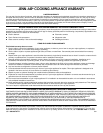
2
I
MPORTANT
S
AFETY
I
NSTRUCTIONS
NEVER
leave children alone or unsupervised near the
R
appliance when it is in use or is still hot.
NEVER
allow children to sit or stand on any part of the
R
appliance as they could be injured or burned.
Children must be taught that the appliance and utensils
on it can be hot. Let hot utensils cool in a safe place, out
of reach of small children. Children should be taught
that an appliance is not a toy. Children should not be
allowed to play with controls or other parts of the unit.
CAUTION
NEVER
store items of interest to children in cabinets
above an appliance. Children climbing on the appli-
ance to reach items could be seriously injured.
Many plastics are vulnerable to heat. Keep plastics away
from parts of the appliance that may become warm or
hot. Do not leave plastic items on the cooktop as they
may melt or soften if left too close to a lighted surface
burner.
To eliminate the hazard of reaching over hot surface
burners, cabinet storage should not be provided directly
above a unit. If storage is provided, it should be limited
to items which are used infrequently and which are
safely stored in an area subjected to heat from an
appliance. Temperatures may be unsafe for some items,
such as volatile liquids, cleaners or aerosol sprays.
A faint gas odor may indicate a gas leak. If a gas odor is
detected, shut off the gas supply to the cooktop. Call
your installer or local gas company to have the possible
leak checked.
Never use a match or other flame to
locate a gas leak.
In Case of Fire
Turn off appliance and ventilating hood to avoid spread-
ing the flame. Extinguish flame then turn on hood to
remove smoke and odor.
•
Smother fire or flame in a pan with a lid or cookie
sheet.
NEVER
pick up or move a flaming pan.
Do not use water on grease fires. Use baking soda, or a
dry chemical or foam-type extinguisher to smother fire or
flame.
Child Safety
About Your Appliance
Do not
use the cooktop as a storage area for food or
cooking utensils.
Potentially hot surfaces include cooktop, and areas
facing the cooktop.
NEVER
use this appliance as a space heater to heat or
warm a room. Doing so may result in carbon monoxide
poisoning and overheating of the oven.
NEVER
cover any slots, holes or passages with materi-
als such as aluminum foil. Doing so blocks air flow
and may cause carbon monoxide poisoning. Alumi-
num foil may also trap heat causing a fire hazard.
NEVER
obstruct the flow of combustion and ventila-
tion air by blocking the oven vent or air intakes. Doing
so restricts air to the burners and may result in carbon
monoxide poisoning.
WARNING
Cooking Safety
Always place a pan on a surface burner before turning it
on. Be sure you know which knob controls which
surface burner. Make sure the correct burner is turned
on and that the burner has ignited. When cooking is
completed, turn burner off before removing pan to
prevent exposure to burner flame.
Always adjust surface burner flame so that it does not
extend beyond the bottom edge of the pan. An exces-
sive flame is hazardous, wastes energy and may damage
the appliance, pan or cabinets above the appliance.
NEVER
leave a surface cooking operation unattended
especially when using a high heat setting or when deep
fat frying. Boilovers cause smoking and greasy spillovers
may ignite. Clean up greasy spills as soon as possible.
Do not use high heat for extended cooking operations.
NEVER
heat an unopened container on the surface
burner. Pressure build-up may cause container to burst
resulting in serious personal injury or damage to the
appliance.
Use dry, sturdy potholders. Damp potholders may cause
burns from steam. Dishtowels or other substitutes
should never be used as potholders because they can
trail across hot surface burners and ignite or get caught
on appliance parts.
Always let quantities of hot fat used for deep fat frying
cool before attempting to move or handle.
8/9/06, 9:27 AM3


















